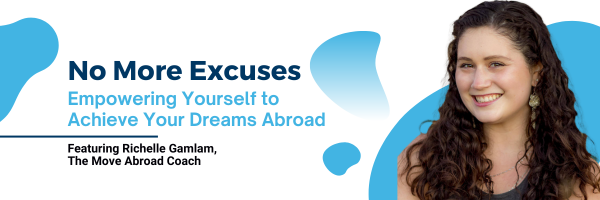No More Excuses: Empowering Yourself to Achieve Your Dreams Abroad
- See the World at Work No More Excuses: Empowering Yourself to Achieve Your Dreams Abroad

Have you ever imagined living in another country somewhere far far away? Have you ever looked at digital nomads, travel enthusiasts, or expats and wondered how they manage to live in the coolest places? Have you ever wondered how people decided where to go and what they did for a living once they got there? Have you ever thought to yourself “I think I can do that”, but have no idea where to start? Enter Richelle Gamlam, the self-dubbed “Move Abroad Coach” helping anyone with the ambitious and sometimes daunting yet immensely rewarding aspiration to thrive abundantly in any corner of the globe. Richelle’s speciality is getting people out of their own way so they can live the life they’ve been dreaming of, anywhere in the world.
So what does that journey look like?
“People get pigeonholed thinking they have to do a particular thing but the reality is…what is right for one person may not be right for another person; it is so unique to the person.”
Richelle’s journey to being the Move Abroad Coach really started when she took her first overseas job as an English teacher in China over a decade ago. Initially, she started a travel blog sharing her experiences in China, which attracted attention from others interested in doing the same. She began coaching people for free via email, but it became overwhelming and turned into a full-time job alongside her teaching. Despite her efforts, she realized that simply answering emails wasn't effectively helping people relocate abroad. To make a real impact, she quit her job in China and started freelancing to focus on coaching full-time.
At the core of her philosophy lies a commitment to empowering individuals to craft their own distinctive blueprint for relocating overseas. This approach goes beyond offering generic advice or one-size-fits-all solutions. Instead, it emphasizes the importance of tailoring each step of the relocation process to suit the individual's specific circumstances, aspirations, and challenges. By fostering a personalized approach, she enables people to not only embark on their journey with clarity and confidence but also to navigate the complexities of moving abroad with a sense of ownership and purpose. This philosophy recognizes that every individual's path to a successful move is inherently unique, and thus, it prioritizes empowering them to design a plan that aligns authentically with their goals and values.
Richelle helps people discover what they really want: “Let's get to the bottom of it - what do you want your dream life overseas to look like – let's work together to make that a reality and it's great to be flexible but it's important to identity what is really important to you and create a plan around that.”
Richelle addresses various challenges associated with moving abroad, highlighting the hurdles individuals face in career transitions, obtaining visas, and managing overwhelming tasks. Transitioning careers, particularly towards freelance or entrepreneurship, often involves overcoming fear. Securing visas for desired countries presents another obstacle. Amidst the multitude of tasks, it's crucial to break them down into manageable chunks to prevent feeling overwhelmed. She also emphasizes the paralysis induced by dwelling on negative "what ifs," suggesting a shift towards considering positive outcomes as well. Ultimately, Richelle encourages reframing challenges as opportunities for personal growth and fulfillment.
“We are so focused on the negative what ifs, but what if this is the best thing you’ve ever done for yourself?” -Richelle Gamlam
Richelle also discussed the importance of flexibility and adaptability when faced with challenges. Instead of persistently pushing through obstacles or giving up entirely, it's beneficial to explore alternative paths. “I see a tendency like if we’re on a path and there is a brick wall – if I just push harder or work more than this brick wall will go away…push push push energy or you see the brick wall and turn around and go home. Two most common defaults: push harder or turn around and go home…But what if we look and see if there is another smaller path that might not look how you originally pictured but with a slightly different way to get there.”
Richelle teaches that empowerment comes from feeling confident in one's ability to make decisions and design their own path. By fostering this confidence, individuals can navigate challenges more effectively and make changes when necessary to align with their goals and values. “Refusing to ask for help is one of the things that self sabotage.”
So what are the common reasons why people state they can’t make that life changing move? ““I can’t move abroad because [insert reason here]....” – these are typically excuses and not good reasons…Kids, pets, no jobs, health condition, not a millionaire, ruining careers — common excuses we latch onto these reasons why we can’t even though if we did some research you’ll realize there are misconceptions and I spend a lot of time busting those misconceptions.”
Richelle reflects on people’s tendency to blame external factors for challenges rather than taking personal responsibility. It's easier for our brains to accept external reasons for failure rather than acknowledging our own role. However, when individuals realize that they are the main barrier to achieving their goals, it can be empowering. Richelle believes moving abroad is feasible for those who genuinely desire it and are willing to be open and proactive about making it happen. However, in her experience some people prefer to cling to excuses rather than confront the possibility that they are standing in their own way. This resistance to personal accountability can lead to frustration and resentment towards those who have achieved what they desire.
Richelle offers many services to help people towards their move abroad goals, including her signature program called "The Freedom Life," which aims to equip individuals with the foundational knowledge and skills necessary for moving abroad confidently. The program covers various aspects, including job opportunities, starting a business, understanding visa processes, conducting destination research, and managing a move abroad budget. The goal is to empower participants to create personalized plans regardless of the country they choose to move to. Additionally, the program incorporates expert guidance from professionals specializing in areas such as taxation for digital nomads, immigration and visa processing, and career coaching. This approach acknowledges the limitations of individual expertise and emphasizes the value of leveraging a network of experts to provide comprehensive support to program participants.
Richelle sees a growing trend towards remote work and the digital nomad lifestyle, with an increasing number of people aspiring for freedom, flexibility, and financial independence. She believes many individuals seek the ability to work from anywhere in the world, on their own terms, without constraints on their time or location. This desire for autonomy extends to pursuing personal passions and adventures alongside work commitments. Recent world events, such as the pandemic have accelerated the shift towards remote work, leading to a surge in interest from individuals seeking to create a life of freedom and fulfillment. As a result, there is a rising number of people embracing entrepreneurship and self-employment as a means to pursue their dreams and design their own lifestyle.
“For many of us, moving abroad can be a bit scary because of the what ifs; and when those fears pop up what we need to do is figure out where are they actually coming from: stability, security, past experiences…For many of these fears they are coming from a place of self preservation but for a lot of us it feels like its life or death that flight or fight instinct in our brains and bodies when those feelings pop up, my suggestion is to recognize it as something separate from you and remember that you know what you’re doing and you’re getting help…say to yourself: Thank you brain, but I’ve got this.” - Richelle Gamlam
Taking inspiration from the book The Mountain is You, Richelle concludes: “Humans aren’t wired to be happy, we’re wired to be comfortable…and our brains are wired to keep us trapped in a comfort zone – but it's not actually comfortable, it's just what is familiar. What if we have to make ourselves uncomfortable to be happy, satisfied, and fulfilled?”
If you want to get in touch with The Move Abroad Coach, check out her website for her various valuable services and offerings, as well as her Move Abroad Coach podcast. If you want to jump in, also check out Richelle’s $37 crash course that you can start today at https://www.moveabroadcourse.com/join-now.
Related Content




Comments